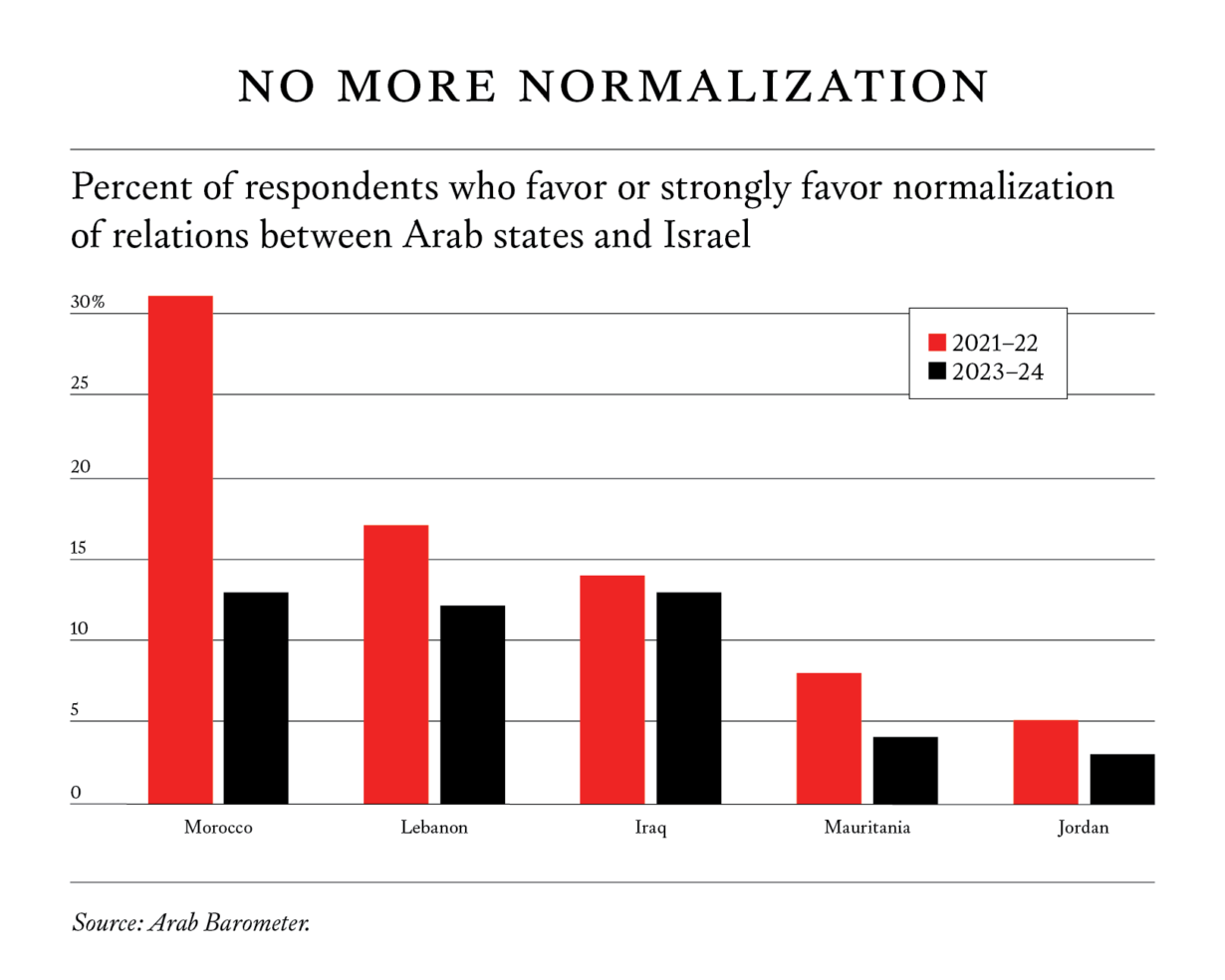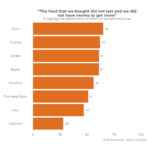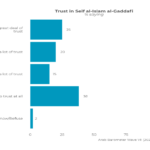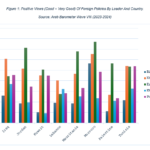
For Immediate Release
**Please credit Arab Barometer and Foreign Affairs Magazine**
A new Foreign Affairs article analyzes Arab Barometer’s latest wave of surveys, revealing a sharp decline in support for normalization with Israel—and in favorability toward its Western allies—across the Middle East and North Africa following Israel’s war in Gaza post-October 7. Public opposition has halted normalization efforts, constraining regional governments’ foreign policy without progress on Palestinian statehood.
Below are key findings from Arab Barometer’s 2023–2024 survey wave, including those featured in the Foreign Affairs analysis:
- Public support for the Palestinian cause has deepened.
Ordinary citizens in the Middle East and North Africa have long supported Palestinian statehood, and in the nine months following the Israeli military campaign in Gaza, that commitment deepened. - Israel widely condemned by Arab publics.
From Morocco to Kuwait, majorities described Israel’s assault on Gaza using terms like “genocide,” “massacre,” or “ethnic cleansing.” - Hostility toward Israel remains prevalent.
Just 3% of Tunisians, for example, reported holding a “very favorable” or “somewhat favorable” opinion of Israel. - Support for normalization collapses.
Public backing for normalization with Israel fell post October-7, including in countries that signed the Abraham Accords. In none of the seven countries surveyed by Arab Barometer in 2023-2024 did support exceed 13%. In most countries, this marks a small decline from already low levels. In Morocco, which normalized relations with Israel in 2020, support fell from 31% in 2022 to 13% after October 7, 2023. - Two-state solution remains broadly supported.
Even after Israel’s military response to the October 7 attacks, majorities in nearly all surveyed MENA countries continued to support a two-state solution and recognized Israel’s right to exist. - Israel’s Western allies suffer sharp declines in public favor due to Gaza war.
- U.S. favorability fell 23 percentage points in Jordan, 19 in Mauritania, 15 in Lebanon, and 7 in Iraq.
- Other Israel allies saw similar drops: France’s favorability fell 20 percentage points in Lebanon, 17 in Mauritania, 10 in Morocco; the UK’s by 38 points in Morocco, 11 in Jordan, 5 in Iraq.
- China’s image improved dramatically, reversing a years-long decline.
In contrast to Israel’s Western allies, China’s favorability surged across the Middle East and North Africa, reversing a years-long decline, with increases of 16 percentage points in Jordan, 15 points in Morocco, 10 points in Iraq and 6 points in Lebanon. - Few Arabs believe they can protest freely.
Although protests are not officially banned in most Arab countries, only 36% of citizens across 11 countries surveyed by Arab Barometer in 2021–2022 said they believed they had the freedom to participate in peaceful demonstrations. Just 12% of Egyptians and 25% of Jordanians agreed, with Tunisia as the only country where a majority (61%) felt such freedom exists. Since then, MENA governments have given little reason to believe they have become more open to dissent. - Protests persist despite perceived limits on freedom.
In 2024, at least 10% of adults in every MENA country surveyed by Arab Barometer reported taking part in a protest—matching levels seen in the U.S. during the 2020 protests against police brutality. - Kuwaitis Engage in Pro-Palestinian Activism Despite Protest Restrictions
Although the Kuwaiti government banned pro-Palestinian demonstrations, many citizens engaged through other activism. In Arab Barometer’s March 2024 survey, 84% reported boycotting companies supporting Israel, 62% donated to support Gazans, 40% shared pro-Palestinian messages online, and 22% participated in public solidarity activities. - MENA Public opinion is restraining policy on Israel.
Daily protests across the region may not prompt major policy reversals, but they limit what autocratic governments can do. Arab leaders remain reluctant to challenge Israel directly—yet are also unwilling to confront public backlash by advancing closer cooperation.
The article was authored by Michael Robbins, Director of Arab Barometer, and Amaney Jamal, Co-Principal Investigator of Arab Barometer and Dean of the Princeton School of Public and International Affairs.
Read the full analysis in Foreign Affairs.
Access the full article as a PDF here.
Please credit Arab Barometer and Foreign Affairs magazine in any dissemination.
ENDS //
Arab Barometer Media Resources
For more information or to schedule an interview with the authors of the Foreign Affairs piece – Michael Robbins and Dean Amaney Jamal, please contact Aseel Alayli, Director of Brand, Marketing and Global Communications, at aalayli@princeton.edu.
• Website: www.arabbarometer.org
• Resources for Media: www.arabbarometer.org/media-news
• FAQ: www.arabbarometer.org/frequently-asked-questions
• About Arab Barometer: www.arabbarometer.org/about
• Methodology: www.arabbarometer.org/survey-data/methodology


